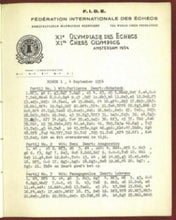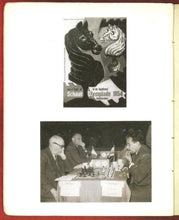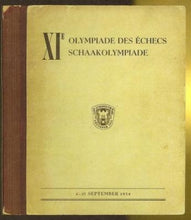Author: Fédération Internationale des Échecs
Year: 1954
Publisher: Fédération Internationale des Échecs
Place: Amsterdam
Description:
unpaginaged with eight pages of plates, tables and index. Octavo (8 1/4" x 6 1/2") bound in original publisher's wrappers. (Foldeak 218) First edition.
During the war and in the decade afterwards Argentina became quite a force in the chess world. This stimulated the national federation to undertake - at the FIDE Congress at Helsinki - the organization of the 11th Olympiad. It promised to refund the traveling expenses (continent to continent) of the European teams, which comprised the best part of the competitors - both as regards quantity and quality. With preparations along these lines in progress everywhere the Argentine Chess Federation stated, only six weeks before the proposed date of the start, that growing financial difficulties prevented it from organizing the Olympiad after all. It seemed that the great event would fall through, but two days later Holland, a small country to which chess-players are so much indebted (one need think no further than the World Championship matches played there, the AVRO Tournament of 1938, and Groningen 1946) informed the President of FIDE that i was willing to organize the Olympiad in spite of the short time in which to prepare. This news was welcomed by everyone. Twenty-six countries arrived to take place in the tournament. The preliminaries, consisting of four groups, lasted from September 4th to 11th. They resulted in all twelve seeded teams qualifying to the Final (though the tie between England and Switzerland ad to be decided on the outcome of their individual encounter). The other placings were much the same as in the previous Olympiad. The Hungarians, with but the one reserve, were don on their luck again, for they might well have been one or two places higher. On the other hand, the elderly Israeli team (their average age was forty-eight) earned itself high praise. The participation of Bulgaria and Iceland in the Final and the performance of the Swiss in winning Section B were warmly received. Youth played an important role in all these teams and thus raised great hopes for the future. The special prizes for the best individual results on each board were awared to Botvinnik, Anderson, Barcza, Keres, Geller and Burstein. Keres' score stands out above all the rest; he won thirteen games out of fourteen and only allowed Nilsson of Sweden to draw with him. The generosity of the Dutch had enable the third post-war Olympiad to be carried through with complete success. The play had been of a high standard, and the competitors took leave of each other in the friendly hope of meeting again at Moscow.
Condition:
Some closed edge tears, corners rubbed and bumped, some plates beginning to loosen, spine head rubbed else a good to very good copy.
SOLD 2021





